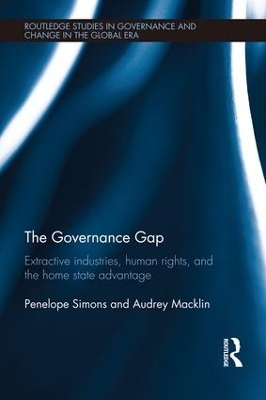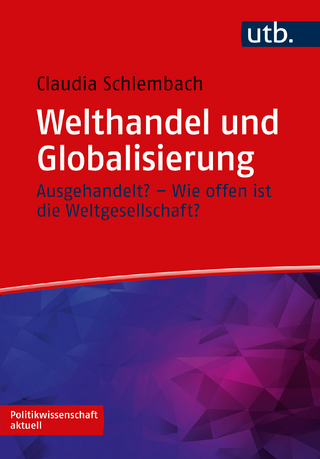
The Governance Gap
Extractive Industries, Human Rights, and the Home State Advantage
Seiten
2015
Routledge (Verlag)
978-1-138-12491-2 (ISBN)
Routledge (Verlag)
978-1-138-12491-2 (ISBN)
This impressive book examines human rights in war zones - especially where the interests of international corporations seem to be placed ahead of individuals rights.
This book explores the persistence of the governance gap with respect to the human rights-impacting conduct of transnational extractive corporations operating in zones of weak governance.
The authors launch their account with a fascinating case study of Talisman Energy’s experience in Sudan, informed by their own experience as members of the 1999 Canadian Assessment Mission to Sudan (Harker Mission). Drawing on new governance, reflexive law and responsive law theories, the authors assess legal and other non-binding governance mechanisms that have emerged since that time, including the UN Guiding Principles on Business and Human Rights. They conclude that such mechanisms are incapable of systematically preventing human rights violating behaviour by transnational corporations, or of assuring accountability of these actors or recompense for victims of such violations. The authors contend that home state regulation, while not a silver bullet, has a crucial role to play in regulating such conduct. They pick up where UN Special Representative John Ruggie’s Guiding Principles on Business and Human Rights left off, and propose an innovative, robust and adaptable template for strengthening the regulatory framework of home states. Their model draws insights from the theoretical literature, leverages existing public, private, transnational, national, ‘soft’ and hard regulatory tools, and harnesses the specific strengths of state-based governance.
This book will be of interest to academics, policy makers, students, civil society and business leaders.
This book explores the persistence of the governance gap with respect to the human rights-impacting conduct of transnational extractive corporations operating in zones of weak governance.
The authors launch their account with a fascinating case study of Talisman Energy’s experience in Sudan, informed by their own experience as members of the 1999 Canadian Assessment Mission to Sudan (Harker Mission). Drawing on new governance, reflexive law and responsive law theories, the authors assess legal and other non-binding governance mechanisms that have emerged since that time, including the UN Guiding Principles on Business and Human Rights. They conclude that such mechanisms are incapable of systematically preventing human rights violating behaviour by transnational corporations, or of assuring accountability of these actors or recompense for victims of such violations. The authors contend that home state regulation, while not a silver bullet, has a crucial role to play in regulating such conduct. They pick up where UN Special Representative John Ruggie’s Guiding Principles on Business and Human Rights left off, and propose an innovative, robust and adaptable template for strengthening the regulatory framework of home states. Their model draws insights from the theoretical literature, leverages existing public, private, transnational, national, ‘soft’ and hard regulatory tools, and harnesses the specific strengths of state-based governance.
This book will be of interest to academics, policy makers, students, civil society and business leaders.
Penelope Simons is Associate Professor of Law at the University of Ottawa, Canada. Audrey Macklin is Professor of Law at the University of Toronto, Canada.
1. Introduction 2. Talisman in Sudan 3. The Governance Gap: Multistakeholder and intergovernmental initiatives 4. The Governance Gap: Domestic laws and other governance mechanisms 5. Extractive Industries, Human Rights and the Home State Advantage
| Reihe/Serie | Routledge Studies in Governance and Change in the Global Era |
|---|---|
| Zusatzinfo | 1 Tables, black and white; 5 Line drawings, black and white; 5 Illustrations, black and white |
| Verlagsort | London |
| Sprache | englisch |
| Maße | 156 x 234 mm |
| Gewicht | 793 g |
| Themenwelt | Recht / Steuern ► Allgemeines / Lexika |
| Recht / Steuern ► EU / Internationales Recht | |
| Sozialwissenschaften ► Politik / Verwaltung | |
| Technik ► Bergbau | |
| Wirtschaft ► Volkswirtschaftslehre ► Wirtschaftspolitik | |
| ISBN-10 | 1-138-12491-5 / 1138124915 |
| ISBN-13 | 978-1-138-12491-2 / 9781138124912 |
| Zustand | Neuware |
| Haben Sie eine Frage zum Produkt? |
Mehr entdecken
aus dem Bereich
aus dem Bereich
ausgehandelt? – wie offen ist die Weltgesellschaft?
Buch | Softcover (2024)
UTB (Verlag)
CHF 30,80
Theorie und Anwendung
Buch | Hardcover (2024)
Vahlen, Franz (Verlag)
CHF 55,70
wie sich unsere Wirtschaftspolitik ändern muss, damit wir globale …
Buch | Hardcover (2024)
Wiley-VCH (Verlag)
CHF 55,95


